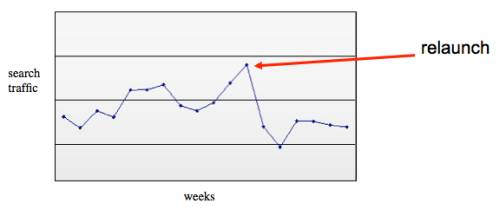While reading another excellent Yahoo patent dissection by Bill Slawski (How a Search Engine May Identify Undesirable Web Pages By Analyzing Inlinks) I couldn’t help thinking about SEOs, particularly agencies.
Today I also happened to read some affiliate (joint venture) promotional emails pushing a new link-building tool, but I won’t give it any exposure here other than to say that the promoter was complaining about a “Google slap” to SEOs. There is a growing theme here.
A few days earlier I read The 8-Step SEO Strategy, Step 1: Define Your Target Audience and Their Needs where Laura Lippay posted a graph of Yahoo’s traffic drop following a relaunch. Their traffic never recovered. This was almost the same graph I had seen at the Australian Yellow Pages® site following a major relaunch last September and thence.

What “used to work” isn’t working now, it would seem. Blame some of it on the Caffeine update; blame some on Google conspiracy theories, but blame a lot on not keeping up-to-date. Either way, some SEOs must be worried.
I consult to some of these agencies and have noticed a 30% drop in ranking success at one agency I have known for several years. I have also seen the work of other agencies where the customer didn’t get ranking joy and moved to another SEO.
The common theme arising at these SEO agencies is a failure to keep up with the search engines. Many use a checklist to tick off a list of tasks such as the following real example (their words):
- Article submission
- Directory submission
- Search Engine submission
- Social Networks submission
- Technical errors correction
- Remove Meta robots
- Robots
- Google Sitemap
- Google Analytics code
- Meta Keywords
- Meta Description
- Page Title
- Image Alt Tags
- H1 Tags
- Content pasting
Those tasks are mostly fine, but the main issue is that this templated approach doesn’t suit all projects. After working with the agency (which needs to use checklists), they now have three longer checklists covering three kinds of projects they get:
- Competitive niches
- Non-competitive niches
- Ecommerce sites in competitive niches
Back to the Yahoo patent, there is more scrutiny of backlinks to detect unnatural patterns. Most agencies I know keep a list of submission-friendly directories and blogs. They usually submit all clients to the same list but the more savvy ones take care to match a client to a relevant industry directory.
Too many directory links in quick succession should raise a flag at the search engines. What about a link from EzineArticles? If your site is linked from an article submitted to this popular directory, followed by a couple of others, does this look unnatural? Sure does to me. Most business owners would neither know those sites nor the concept of writing articles for republication. If search engines did not exist, would anyone write articles containing links to a website and submit them to an article directory?
Would an agency client be notified about a fairly new development that has SEO implications, such as microformats and have it implemented in their code? Google just announced mark up support for recipe RDFa/hRecipe microformats, which isn’t new, but once Google announces something like this, a lot of SEOs will take note.
(Incidentally, there is a WordPress plugin for hRecipe.)